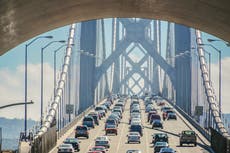Washington to follow California with ban on gas-powered cars as red-leaning states sue
Washington Governor Jay Inslee called California’s ruling a ‘critical milestone in our climate fight’
California announced this week that it will ban the sale of all new gasoline-powered cars by 2035.
It was quickly followed by Washington state, which also declared a ban on gas-powered cars by that date, signalling major changes for the US auto industry.
“Washington set in law a goal for all new car sales to be zero emissions by 2030 and we’re ready to adopt California’s regs by end of this year,” Washington Governor Jay Inslee tweeted on Wednesday, calling California’s ruling a “critical milestone in our climate fight.”
The announcements were met with pushback by some Republican lawmakers. In May, a group of states led by Republican attorneys-general filed a lawsuit against the Environmental Protection Agency (EPA) to stop California from setting new greenhouse gas emissions standards.
“We will continue to fight California’s efforts to impose their radical policies on the rest of the country,” a spokesperson for Missouri Attorney General Eric Schmitt, a party to the lawsuit, told the St. Louis Post-Dispatch this week.
These interstate squabbles come as the federal government tries to boost sales of electric vehicles (EVs) nationwide via subsidies in the recently-passed Inflation Reduction Act.
President Joe Biden has said that he’d like 50 per cent of all car sales in the US to be electric by 2030.
Under the 1970 Clean Air Act, California can receive a waiver from the Environmental Protection Agency (EPA) to regulate its own vehicle pollution.
That ability was officially extended to greenhouse gases under the Obama administration, before being rescinded by former President Donald Trump. Earlier this year, the Biden administration allowed California to set its own emissions standards again.
California is the fifth-largest economy in the world – and has the most cars of any US state. As a result, many automakers work to abide by California’s emissions rules so as not to miss out on the lucrative market.
California’s new measures will not ban gas-powered cars entirely but sales of new gasoline cars. Used cars can still be sold and owners of gas-powered cars can still drive them.
In 2020, Washington state lawmakers passed a bill tying the state’s emissions standards to California’s measures, reported The Seattle Times.
In addition to Washington, 15 other states and the District of Columbia have followed prior California emissions standards, according to the Los Angeles Times, making up more than 40 per cent of the country’s passenger vehicle market.
It’s likely that more states will soon follow California’s lead on the 2035 ban of new internal combustion engine vehicles.
Some other states have taken umbrage at California’s ability to regulate its own greenhouse gases. In May, attorneys-general from Ohio, Alabama, Arkansas, Georgia, Indiana, Kansas, Kentucky, Louisiana, Mississippi, Missouri, Montana, Nebraska, Oklahoma, South Carolina, Texas, Utah and West Virginia filed a lawsuit asking the EPA to rescind the state’s ability to regulate greenhouse gas emissions from vehicles.
Missouri AG Schmitt’s office said in a statement on the lawsuit that the EPA “may not waive Clean Air Act preemption for California alone because the statute allowing it to do so violates the States’ equal sovereignty.”
“If California is able to set restrictive ‘gas emissions’ standards, manufacturing becomes astronomically expensive, and those additional costs are passed onto consumers,” Mr Schmitt, the GOP nominee for US Senate in Missouri, wrote.
Even before California’s new law, US customers have been buying more electric cars. In the first quarter of 2022, more than 200,000 EVs were sold, compared to under 25,000 per quarter less than a decade ago, EV blog electrek reported.
EVs already make up a sizeable portion of California’s cars. More than 16 per cent of cars sold in the state in early 2022 were zero-emissions vehicles, according to Governor Gavin Newsom’s office. The state had more than 500,000 electric cars registered by the end of 2021.
The transition to electric cars could significantly cut the US’s domestic carbon footprint.
The average gas-powered car emits the equivalent of 11,435 pounds of carbon dioxide (CO2) per year, according to the US Department of Energy. In comparison, the average electric car releases the equivalent of just 3,932 pounds of CO2 per year, according to the agency.
Transportation is the single largest source of planet-warming greenhouse gas emissions in the US, according to the EPA. Most of those emissions — 57 per cent — come from light-duty vehicles, meaning passenger cars.
Join our commenting forum
Join thought-provoking conversations, follow other Independent readers and see their replies
Comments


Bookmark popover
Removed from bookmarks